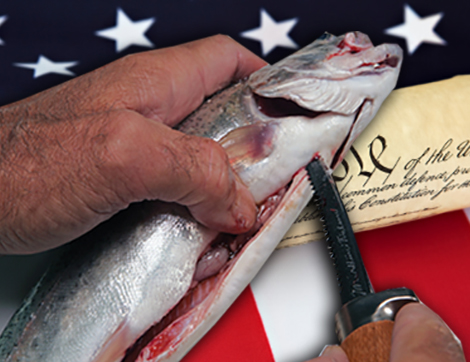
• Four “conservative” Supreme Court justices join to undercut constitutional search & seizure safeguards.
By Ronald L. Ray —
The Supreme Court of the United States (SCOTUS) just dealt the death blow to the Fourth Amendment to the Constitution. In a bizarre decision in Utah v. Strieff, the court voted 5-3 to make a dead letter of that fundamental protection against tyranny. Liberal Justice Stephen Breyer joined the four allegedly Catholic, ostensibly “conservative” justices in a majority opinion rendered by Justice Clarence Thomas. The remaining three liberal justices, Sonia Sotomayor, Elena Kagan, and Ruth Bader Ginsberg, ironically, defended the rights enshrined in the Fourth Amendment.
Our founding fathers’ straightforward language in that amendment states:
“The right of the people to be secure in their persons, houses, papers, and effects, against unreasonable searches and seizures, shall not be violated, and no Warrants shall issue, but upon probable cause, supported by Oath or affirmation, and particularly describing the place to be searched, and the persons or things to be seized.”
But, in an illogical thought process not unlike that through which SCOTUS discovered—i.e., invented—a “right” to abortion in the “penumbras” of the Constitution, the “originalist” and “strict constructionist” members of the court resumed their paradoxically activist jihad against citizens’ constitutional protections, greatly expanding the U.S. police state.
In the Strieff case, which originated in December 2006, Edward Strieff left a South Salt Lake City, Utah, house on foot. Narcotics detective Douglas Fackrell had been observing that house periodically for possible illegal drug activity. Fackrell approached pedestrian Strieff and demanded identification without probable cause to make the stop. All parties, including all SCOTUS justices, agree this violated the Fourth Amendment.
Fackrell ran a warrant check on Strieff—again, without probable cause—and “discovered” an outstanding arrest warrant for a traffic violation. Fackrell then arrested Strieff and searched him, finding a quantity of illegal methamphetamines.
Strieff was convicted subsequently of a drug violation and appealed. A unanimous Utah Supreme Court overturned the conviction because of the “exclusionary rule,” preventing the use of criminal evidence obtained through an unconstitutional search or seizure, even though, as a result, ostensibly clear criminal activity sometimes goes unpunished. The state appealed to SCOTUS.
The question before the court was fundamental: whether there are significant exceptions to the people’s rights guaranteed by the Fourth Amendment. For a number of years, SCOTUS has answered “yes,” gradually expanding the range of police activity that allegedly voids those constitutional protections. And it has been the state-worshiping, supposedly conservative justices—including the late Antonin Scalia—who have abandoned the Constitution and right reason in favor of even the most egregiously improper law enforcement tactics.
Through sophistry and bad logic, Thomas essentially declared that the ends justify the means. If the activity or object discovered through an unconstitutional police action is illegal, the evidence can still be used against the suspect if the
connection between the unconstitutional policing and the search or seizure is “attenuated” by an intervening circumstance—in this case, the warrant check.
But the warrant check was an intended and immediate aspect of the detective’s “fishing expedition” for evidence and therefore cannot justifiably be separated from the unconstitutional demand for “papers, please.”
Thomas’s opinion, put simply: Criminal evidence discovered unconstitutionally, good; no criminal evidence discovered through unconstitutional police behavior, seemingly still bad. Such poor reasoning by Thomas suggests either mental incompetence or a vicious hatred for the citizenry.
To arrive at his conclusion, Thomas assumes a great deal: the detective’s “good intentions” and ignorance of the law in the face of his own testimony, and the supposedly rare and isolated nature of this sort of constitutional violation. Apparently, the Fourth Amendment is merely a deterrent to bad police behavior, according to SCOTUS, but no deterrent is needed, because cops allegedly mean well.
Justice Sotomayor excoriated Thomas’s incredibly deceptive and wrongheaded opinion: “The court today holds that the discovery of a warrant for an unpaid parking ticket will forgive a police officer’s violation of your Fourth Amendment rights. . . . [Fackrell’s] discovery of a warrant was not some intervening surprise that he could not have anticipated. Utah lists over 180,000 misdemeanor warrants in its database.”
Emigrate While You Still Can! Learn More . . .
Strieff is the final chisel mark on the Fourth Amendment’s gravestone. From Whren to Brinegar to Herring to Heien v. North Carolina, SCOTUS has justified law enforcement’s phony excuses for stopping citizens, ignorance of fact, and even ignorance of the law. Citizens’ ignorance of the law, however, will land them in jail. If an officer’s actions are “reasonable,” the Fourth Amendment does not apply. “We don’t need no stinking search warrant.”
Turning the Constitution on its head, the SCOTUS justices now allow police to stop a citizen for any or no reason, “discover” grounds for arrest, and use any evidence “found” to criminalize the individual. But don’t worry. The impeccably honest, even if stupid, police would never falsify a post-facto search warrant or plant evidence on a suspect. Yeah, right.
Thomas has a point, though. Clearly, the tyrannical and increasingly demented or insane Supreme Court is a far greater danger to our freedom. Still, two wrongs don’t make a right. Time to impeach, try, and remove the “Idiotic Eight.”
Ronald L. Ray is a freelance author and an assistant editor of THE BARNES REVIEW. He is a descendant of several patriots of the American War for Independence.


1 Comment on Fourth Amendment Gutted